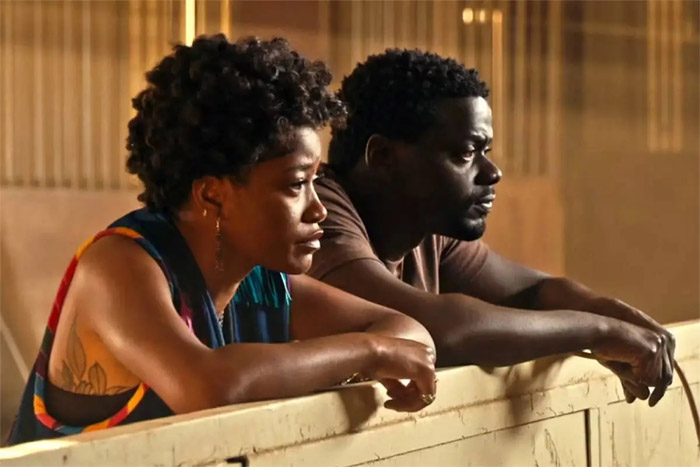Directed by Jordan Peele
Screening at Picturehouse
Reviewed by Nick Daly
Nope opens with a blood-smeared chimpanzee wondering around a television studio. Motionless bodies surround him and a little girl’s shoe is standing up inexplicably on its end. Before even the notion of an opening credit, Nope sets its tone immediately. Whether this bewildering tone is appreciated will depend entirely on the viewer.
Director Jordan Peele exploded onto the film scene with 2017’s Get Out, a film that created something of a cultural shift with its seamless blend of horror/comedy and social commentary. In 2022’s Nope, Peele reunites with his Get Out star Daniel Kaluuya, but audiences expecting a rinse-and-repeat may be in for a surprise.
After their father is mysteriously killed by a nickel falling from the sky, OJ Haywood (Kaluuya) and his sister Emerald (Keke Palmer) inherit his business of wrangling horses for film productions. This isn’t their only film industry connection, as the Haywood’s are also decedents of the unnamed horse rider from Eadweard Muybridge’s Animal Locomotion; a series of photographs from 1887 that laid the foundation for motion pictures.
Nearby on the lonely gulch were the siblings live, former child actor Jupe (Steven Yuen) operates a small Western theme park where he exploits a childhood incident for profit. The incident in question (glimpsed briefly in the film’s bewildering opening scene) is a chimpanzee animal actor brutally attacking his human co-stars on the set of a sitcom called Gordy’s Home, in which a young Jupe starred.
Following an incident on a film set, where one of the Haywood’s horses reacts aggressively to a flashbulb in its eyes, the siblings are fired from the production and are contemplating an offer from Jupe to buy the ranch. That night, however, they notice their electricity fluctuating and the horses reacting strangely to an unknown presence. OJ observes the night sky. He sees lights and something lands on the ground further ahead.
Nope takes the classic UFO, almost humorous with its archetypal saucer shape and fondness for vacuuming up Earth’s inhabitants, and manages to make something horrific out of it. It haunts the gloomy skies like a shark just underneath the ocean’s surface, and a claustrophobic scene inside its fleshy passageways makes you long for some typical anal probing instead.
As the object approaches the dusty ground, it conjures sand blizzards that convey a true solidness of the object rarely seen in a film landscape saturated with the weightlessness of CGI. This thing feels unnervingly real. This is where the film really showcases its cinematographer; Christopher Nolan regular Hoyte Van Hoytema, whose sequences radiate with a dark, looming threat and atmosphere and prove to be one of the film’s strongest points.
However, it’s arguable whether the plot of the film can be considered as strong. While Get Out wasn’t short of a few subtle visual metaphors, it was more direct with its meditation on race and slavery. Nope, on the other hand, demands more work from its viewers with its subtle, almost abstract analogies which some might perceive as muddled and not as concise as the director’s debut. While Get Out works solely as an entertaining horror film without being overpowered by its subtext, Nope’s genre element of science fiction is essentially a backdrop for its own subtext. It raises one too many questions to be viewed simply as an alien invasion film, and is more akin to an arthouse film with a blockbuster budget. The result is a film far less accessible to mainstream audiences.
These raised questions are never directly answered by the film but are merely left to be pondered on. The narrative strands of the UFO, Jupe and the Gordy’s Home incident appear to convey a running theme of exploitation, and the attempt to profit from a wild beast in the entertainment industry. With surveillance cameras, IMAX cameras and even a TMZ paparazzi all making appearances, the film also acts as something of a history lesson on how this has been recorded throughout time. Is the UFO a symbol for Hollywood? A gigantic force that people chase for fame and money, but when engaged with (like looking into the eye of a horse) merely sucks people up and spits them back out? A rhetorical question, of course.
With this in mind, it seems to be no accident that the film is set up similar to an archetypal Hollywood blockbuster, making several nods to Steven Spielberg classics like Jaws and Close Encounters of the Third Kind. What’s interesting is that while Peele is one of a long list of directors to have made a film about their own industry, rather than being a celebratory ode to cinema (La La Land, Once Upon a Time… in Hollywood) Peele appears to harbour a more cynical view and has created something of a critique of it.
A little girl’s shoe standing up on its end, however? I have no idea.
